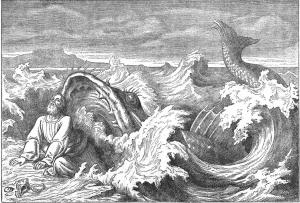(Lectionary for January 21, 2018)
 We Christians do not know the story of Jonah well enough. It is a tale that is so relevant, so perspicacious for our day, that it is a terrible shame that it is not written right on all of our hearts. And it is a deeper shame that all we seem to know of it is that something like a whale (literally in the story “a big fish”) swallows the titular “hero,” and for centuries one’s ability to believe that whopper became a true test of some sort of faith. Hokum and bunkum! The fish is in the story all right, but his swallowing role is secondary at best. The real focus must be on Jonah, that appalling prophet whose knowledge of and constant quoting of sacred scripture reveals all too well his rank and repulsive hypocrisy. Like Moliere’s oily Tartuffe, Jonah is a prophetic mountebank, a disgusting purveyor of religion-lite belief and practice which in fact turns out to be nothing but “lies and mendacity,” if I may quote Big Daddy in “Cat on a Hot Tin Roof.”
We Christians do not know the story of Jonah well enough. It is a tale that is so relevant, so perspicacious for our day, that it is a terrible shame that it is not written right on all of our hearts. And it is a deeper shame that all we seem to know of it is that something like a whale (literally in the story “a big fish”) swallows the titular “hero,” and for centuries one’s ability to believe that whopper became a true test of some sort of faith. Hokum and bunkum! The fish is in the story all right, but his swallowing role is secondary at best. The real focus must be on Jonah, that appalling prophet whose knowledge of and constant quoting of sacred scripture reveals all too well his rank and repulsive hypocrisy. Like Moliere’s oily Tartuffe, Jonah is a prophetic mountebank, a disgusting purveyor of religion-lite belief and practice which in fact turns out to be nothing but “lies and mendacity,” if I may quote Big Daddy in “Cat on a Hot Tin Roof.”
Jonah is the focus, but since Jonah is a supposed representative of YHWH, is designated as YHWH’s prophet (Jonah 1:1), the true hero/heroine of the book is none other than YHWH. What Jonah teaches is that his ways of construing the actions of God are precisely the opposite of what that God is finally in the business of doing. So, we listen to Jonah but we do not do as he asks or believes; we seek after Jonah’s God and may discover that God by in the end paying no attention to this so-called prophet at all, however much he brays his idiotic beliefs to us.
His hypocrisy is manifest with his every word or lack thereof. When asked to go to Nineveh by YHWH, he rushes headlong in the opposite direction, saying nothing, hightailing it to Tarshish as fast as he can go. But thinking he can escape the call of this God by running, he discovers his error when a huge storm, sent directly by YHWH, engulfs his escape ship, forcing the ship’s crew to search for a culprit for the storm. They throw dice and the dice, apparently loaded, fall right on Jonah. Bombarding him with questions of his origins, his ancestry, his work, Jonah cries, “I am a Hebrew, and I worship YHWH, God of the skies, who made the sea and the dry land” (Jonah 1:9). Is it not revealing that this prophet—the very word means “mouthpiece”—who has said nothing before this speech, now announces that he reveres a God who made sea and land, while he is running away from that very God on the sea that God supposedly made? Hypocrisy is his name, and though Jonah is Hebrew for “dove,” he will prove to be more vulture than dove in the tale.
 His hypocrisies multiply as he moves through the adventure. After being swallowed by the big fish, a fish called forth by YHWH, (Jonah 2), he procedes to blame YHWH for his plight, while claiming to praise YHWH for saving him from drowning in YHWH’s own waves and billows. He further says that he “has been driven from YHWH’s presence” (Jonah 2:4), while we all know, especially Jonah, that he has in fact run from YHWH as fast as he could. He says that he finally remembered YHWH “as his life was ebbing away,” a good time for God thought, a kind of fish-belly religion, one might say. He ends his odious prayer by announcing that he will at some time in the distant future “sacrifice to YHWH and make vows” (Jonah 2:9), two actions the formerly pagan sailors are performing at the very moment of Jonah’s prayer. And after that prayer, as my old seminary teacher, Bill Power, was fond of saying, “The Big Fish throws up.” And I would add that my sentiments are with the fish.
His hypocrisies multiply as he moves through the adventure. After being swallowed by the big fish, a fish called forth by YHWH, (Jonah 2), he procedes to blame YHWH for his plight, while claiming to praise YHWH for saving him from drowning in YHWH’s own waves and billows. He further says that he “has been driven from YHWH’s presence” (Jonah 2:4), while we all know, especially Jonah, that he has in fact run from YHWH as fast as he could. He says that he finally remembered YHWH “as his life was ebbing away,” a good time for God thought, a kind of fish-belly religion, one might say. He ends his odious prayer by announcing that he will at some time in the distant future “sacrifice to YHWH and make vows” (Jonah 2:9), two actions the formerly pagan sailors are performing at the very moment of Jonah’s prayer. And after that prayer, as my old seminary teacher, Bill Power, was fond of saying, “The Big Fish throws up.” And I would add that my sentiments are with the fish.
Still, Jonah’s ending for his prayer, “Deliverance is YHWH’s,” says far more than he intends. The prophet here becomes genuinely prophetic, though that is hardly his intent. Deliverance does belong to YHWH, as the story will say with unforgettable power and equally unforgettable humor. And in Jonah 3, the hapless fool will again say far more than he intends. As he walks a one-day journey into the vast city of Nineveh, stands on one street corner, and utters a five-word (Hebrew) sermon to the passersby, he shouts, “Forty days, and Nineveh will be overthrown” (Jonah 3:4)! But the verb he uses has multiple meanings. It is plain that Jonah uses the word to mean “destroy,” but another meaning is “changed.” And the latter meaning is the one that works.
The tiny sermon—indeed no sermon in history can have been more effective!— converts the entire evil city of Nineveh from king to commoner, from dog to cow. All now cry out and moo lustily to God for forgiveness, and YHWH hears and responds, saving Nineveh as a place of God henceforth. A normal prophet would have been very glad, one supposes, to have been so successful at the prophetic task. It might be said that Jonah is the only successful prophet in the entire Bible. But instead the prophet is furious, and we will now discover just why he fled from YHWH’s call in the first place. “I knew you were a gracious God and merciful, slow to anger, filled with unbreakable love, ready to relent from punishment” (Jonah 4:2). In other words, Jonah knew all too well that if he opened his trap to these disgusting Ninevites, then YHWH was bound to love them and not destroy them as they so richly deserve. Jonah would rather be dead than worship with a Ninevite! So, he heads out of the city, hoping still for their destruction by a proper God, one who pays people back for their evil, a God in Jonah’s own image.
But alas for Jonah! God refuses his demand for an attack on Nineveh, and instead teaches the prophet that God is one of pity and mercy far more than one of tit-for-tat, getting even fury. It has been said well that God made us in God’s own image, and we have returned the favor over the centuries again and again. Jonah is our model in that abhorrent behavior.
 “Should not I pity Nineveh, that huge city, filled with 120,000 people who do not know right hand from left, not to mention all those cows,” pleads an anxious YHWH to the prophet, Jonah (Jonah 4:11)? And YHWH pleads with us in the same way. How many of our contemporary prophets claim that this or that group is beyond God’s circle of care? Whether they be LGBTQ or persons with darker skin or lighter or persons speaking foreign languages or conservatives or liberals or rich or poor, too often so-called spokespersons of God rule them out of God’s concern. And like Jonah, and the Prodigal’s elder brother, and if I am honest me, too, we all wait on some lonely hillside hoping against hope that God will finally come to God’s senses and will separate and divide the world as we have decided it needs separating and dividing. But we, Jonah and the elder brother and I are wrong; God still pities Nineveh, and because that is so, God still includes in God’s care all people without exception.
“Should not I pity Nineveh, that huge city, filled with 120,000 people who do not know right hand from left, not to mention all those cows,” pleads an anxious YHWH to the prophet, Jonah (Jonah 4:11)? And YHWH pleads with us in the same way. How many of our contemporary prophets claim that this or that group is beyond God’s circle of care? Whether they be LGBTQ or persons with darker skin or lighter or persons speaking foreign languages or conservatives or liberals or rich or poor, too often so-called spokespersons of God rule them out of God’s concern. And like Jonah, and the Prodigal’s elder brother, and if I am honest me, too, we all wait on some lonely hillside hoping against hope that God will finally come to God’s senses and will separate and divide the world as we have decided it needs separating and dividing. But we, Jonah and the elder brother and I are wrong; God still pities Nineveh, and because that is so, God still includes in God’s care all people without exception.
We should all know Jonah, because we are all too often like him. Thanks be to this unknown and hilarious genius who gave us this story, for it is ours for all time. The God we worship is larger and vaster and more inclusive than we can ever imagine, and we are always in the race to catch up with this all-pitying, all-loving, God.
(Images from Wikimedia Commons)











